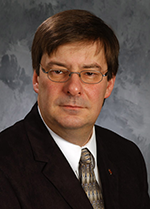 Dr. Benoit Soucy
Dr. Benoit Soucy
On January 24, 2014, Minister of Health Rona Ambrose and the Canadian Centre on Substance Abuse (CCSA) co-hosted a symposium to help identify measures to fight the growing problem of prescription drug abuse in Canada.
Dr. Benoit Soucy, CDA director of clinical and scientific affairs, attended the symposium along with other representatives from the health care sector, government, First Nations and law enforcement. CDA asked Dr. Soucy for more details about the event.
**
CDA: Can you explain the background and context for the symposium?
Dr. Benoit Soucy (BS): About a year ago, CCSA presented a report titled First Do No Harm: Responding to Canada’s Prescription Drug Crisis to explore the issues surrounding the use of prescription drugs in Canada.
Despite the frightening magnitude of prescription drug consumption in Canada—we have the world’s second-highest level of prescription opioid use—there is a general lack of public awareness on the matter. Minister Ambrose and all provincial health ministers agree prescription drug abuse is a major issue in Canada.
CDA: Who attended the symposium?
BS: Health-related organizations like the Canadian Medical Association and Canadian Pharmacists Association, government agencies with expertise in the area as well as non-for-profit groups promoting the fight against prescription drug abuse. Aside from CDA, two other dental organizations attended the event: the Canadian Dental Regulatory Authorities Federation (CDRAF) and Association of Canadian Faculties of Dentistry (ACFD).
CDA: What were the main points discussed that day and how do they relate to dentistry?
BS: The day was organized around four round tables, two of which related to dentistry.
The first round table focused on prevention. Both CDA and ACFD took part in that discussion, which revolved around ways to limit the supply of prescription drugs, to ultimately avoid inappropriate use. From a dentistry standpoint, the obvious observation is that we do prescribe painkillers to our patients. And since it can be difficult to predict needs, we tend to prescribe more for each event than the patient ultimately uses. Here lies part of the problem: medication that has been dispensed to patients, but not used by them, becomes unaccounted for.
Another round table of interest to dentists focused on education. We obviously had a lot to say with regard to education at the school level and as a component of continuing education. All parties involved agreed that education needs to be provided in a non-threatening environment. Practitioners must feel comfortable registering to courses, and know that their participation will not negatively affect their licensure.
The other two round tables covered the topics of treatment and enforcement.
CDA: Is there a perception that the dental profession needs to be doing more to address the issue?
BS: The role dentistry must play has been clearly identified in the First Do No Harm report. There is no doubt that we contribute to the issue, and that is why we have to be part of the solution.
CDA: What concrete actions can the profession take?
BS: We need to make sure we provide dentists with continuing education opportunities on the appropriate dispensation and use of prescription drugs. We also need to work closely with other important stakeholders to address the issue.
CDA: Any advice for the individual dentist?
BS: Without a doubt, the most obvious action dentists can take is to change their prescription practices. They should also take the time to discuss pain management with their patients. Dentists need to educate their patients.
We probably all have had patients showing up for an emergency appointment, complaining about excruciating pain. We can often identify those asking for prescription drugs to satisfy their addiction more than to manage pain. Dealing with those patients is something we must do in a very compassionate fashion.
---
This interview has been condensed for publication. To hear the complete recording, visit Oasis Discussions at: www.oasisdiscussions.ca/2014/02/04/pda/
